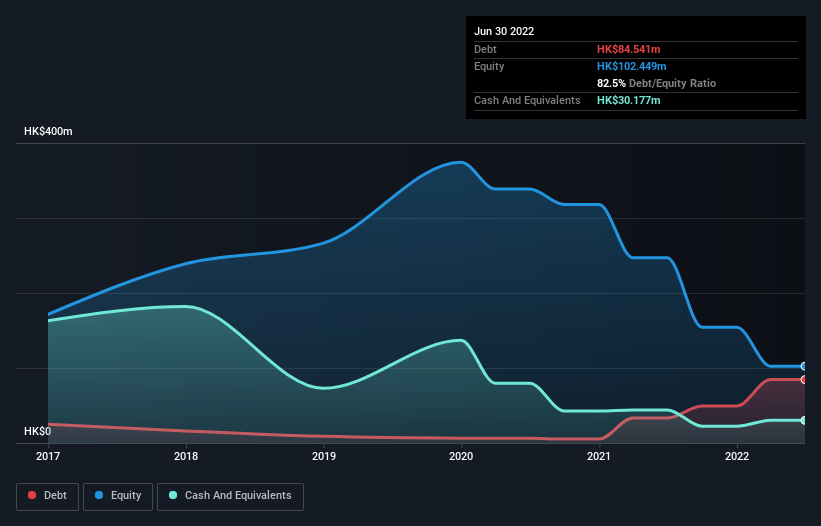- Hong Kong
- /
- Construction
- /
- SEHK:1870
Acme International Holdings (HKG:1870) Is Making Moderate Use Of Debt

Legendary fund manager Li Lu (who Charlie Munger backed) once said, 'The biggest investment risk is not the volatility of prices, but whether you will suffer a permanent loss of capital.' It's only natural to consider a company's balance sheet when you examine how risky it is, since debt is often involved when a business collapses. As with many other companies Acme International Holdings Limited (HKG:1870) makes use of debt. But is this debt a concern to shareholders?
When Is Debt Dangerous?
Debt assists a business until the business has trouble paying it off, either with new capital or with free cash flow. If things get really bad, the lenders can take control of the business. While that is not too common, we often do see indebted companies permanently diluting shareholders because lenders force them to raise capital at a distressed price. Of course, debt can be an important tool in businesses, particularly capital heavy businesses. When we examine debt levels, we first consider both cash and debt levels, together.
See our latest analysis for Acme International Holdings
What Is Acme International Holdings's Net Debt?
You can click the graphic below for the historical numbers, but it shows that as of June 2022 Acme International Holdings had HK$84.5m of debt, an increase on HK$33.3m, over one year. On the flip side, it has HK$30.2m in cash leading to net debt of about HK$54.4m.

How Healthy Is Acme International Holdings' Balance Sheet?
We can see from the most recent balance sheet that Acme International Holdings had liabilities of HK$202.4m falling due within a year, and liabilities of HK$2.81m due beyond that. Offsetting these obligations, it had cash of HK$30.2m as well as receivables valued at HK$137.4m due within 12 months. So its liabilities outweigh the sum of its cash and (near-term) receivables by HK$37.6m.
Given Acme International Holdings has a market capitalization of HK$842.4m, it's hard to believe these liabilities pose much threat. However, we do think it is worth keeping an eye on its balance sheet strength, as it may change over time. The balance sheet is clearly the area to focus on when you are analysing debt. But it is Acme International Holdings's earnings that will influence how the balance sheet holds up in the future. So when considering debt, it's definitely worth looking at the earnings trend. Click here for an interactive snapshot.
Over 12 months, Acme International Holdings made a loss at the EBIT level, and saw its revenue drop to HK$240m, which is a fall of 56%. To be frank that doesn't bode well.
Caveat Emptor
While Acme International Holdings's falling revenue is about as heartwarming as a wet blanket, arguably its earnings before interest and tax (EBIT) loss is even less appealing. Its EBIT loss was a whopping HK$167m. When we look at that and recall the liabilities on its balance sheet, relative to cash, it seems unwise to us for the company to have any debt. Quite frankly we think the balance sheet is far from match-fit, although it could be improved with time. Another cause for caution is that is bled HK$70m in negative free cash flow over the last twelve months. So in short it's a really risky stock. When analysing debt levels, the balance sheet is the obvious place to start. But ultimately, every company can contain risks that exist outside of the balance sheet. Be aware that Acme International Holdings is showing 3 warning signs in our investment analysis , and 2 of those are concerning...
At the end of the day, it's often better to focus on companies that are free from net debt. You can access our special list of such companies (all with a track record of profit growth). It's free.
New: Manage All Your Stock Portfolios in One Place
We've created the ultimate portfolio companion for stock investors, and it's free.
• Connect an unlimited number of Portfolios and see your total in one currency
• Be alerted to new Warning Signs or Risks via email or mobile
• Track the Fair Value of your stocks
Have feedback on this article? Concerned about the content? Get in touch with us directly. Alternatively, email editorial-team (at) simplywallst.com.
This article by Simply Wall St is general in nature. We provide commentary based on historical data and analyst forecasts only using an unbiased methodology and our articles are not intended to be financial advice. It does not constitute a recommendation to buy or sell any stock, and does not take account of your objectives, or your financial situation. We aim to bring you long-term focused analysis driven by fundamental data. Note that our analysis may not factor in the latest price-sensitive company announcements or qualitative material. Simply Wall St has no position in any stocks mentioned.
About SEHK:1870
Acme International Holdings
An investment holding company, provides design and build solutions for building maintenance unit (BMU) system works Hong Kong, Macau, New Zealand, and internationally.
Excellent balance sheet slight.
Market Insights
Community Narratives



